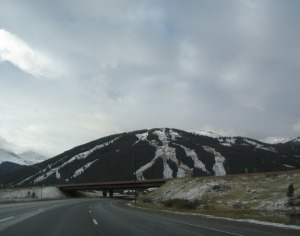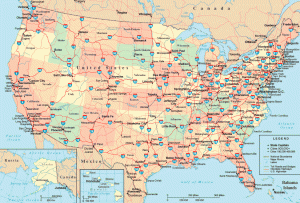Plugged into culture
A few days ago, a CNN Quick Poll asked readers to select whether television, the interstate highway system, or the Internet “has had the most enduring impact on your life.” The poll results (ignore the results on the archived link, as they only show 80 votes) tapped the Internet as the winner: “More than 303,000 people voted; 58 percent selected the Internet as the most enduring innovation, 29 percent selected television, and 14 percent selected the interstate highways.” Interesting.
Television? Eh. Sure, it glorifies visual culture, brings us the delectable Mad Men, drops national politics in our laps, stirs up demand for chia pets, allows pathetic solo dwellers the illusion of company—but it’s too damned passive, reality show voting notwithstanding.
I almost clicked the Internet; after all, I use it constantly. It swallows television, drains it like frat boys consume tequila shots on Saturday Tuesday night. The Internet revolutionized communication, culture, and education, all of which ripple through nearly every sphere of life. Democratizing and decentralizing knowledge, the Internet allows users to tap into the energy of centuries’ worth of knowledge—and misinformation. In their pajamas, citizens may easily access world-class research libraries (and quacks of all types), shop for chocolate, share their memories, take breakdancing classes, pay their bills, chat up a friend, waste hours on Perez Hilton, surf for porn, defraud the elderly, and so much more.
At the last second, though, I voted for the decidely low-tech interstate system, which fundamentally reorganized American life. Commenced in 1956, the interstate system provided a physical link between cities and states that allowed Americans an unprecedented mobility. We could drive further and faster, commute 175 miles a day without blinking or worrying about 25 mph speedtraps. Sleepy burghs transformed into bustling suburbs, where 75% of Americans now live. Families scattered diaspora-like across the plains and over the mountains. Industries grew because trucks—without waiting for rail schedules—could ship goods (televisions and Internet modems, say) to meet immediate demand. Negatively, the interstate system contributed to the gutting of American cities, fostered an addiction to fossil fuels, encouraged untold tons of carbon emissions.
The poll didn’t include my real winner, though, the electrification of rural America. Now that’s lasting impact. Try plugging in your television thingy or your fancy computer gizmo without any juice.
How would you vote?







I would have argued for the Internet until just last week. Jim and I cycled through some little ghost towns along the Tunnel Hill Trail in southern Illinois. These towns were growing metropolises when trains hauled coal out of the region. Then when the trains were replaced by the highway system, these towns basically shrivelled up and disappeared because the highways bypassed these hamlets. We stayed in Vienna, off of I-24, where the receptionists all sat and stared at a computer, playing games that buzzed and clicked when we were asking questions. When we came in after a day of cycling, we could see them play their Internet games. Debbie said that she was born and raised in Tunnel Hill, now hardly enough to fill a pew on a Sunday. But she can still sit in front of her computer, playing games, not because she has the Internet, but because she works a block from the Interstate.
Looking out my window, I guess you too will be putting away your baseball and dreaming of spring.
Betty Draper is hot.
So is Don Draper–must be all the alcohol and cigarettes.